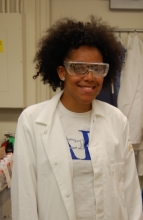
University:
Jackson State University
Major:
Biology
Mentor(s):
Nadine Martinez-Rodriguez
Faculty Sponsor(s):
J. Herbert Waite
Jacob N. Israelachvili
Faculty Sponsor's Department(s):
Mechanical Engineering
Project Title:
The Mechanics of Mussel Adhesion
Project Description:
Due to high failure of artificial underwater adhesives, researchers have focused on another approach, mussel adhesion. Marine mussels have received much attention for their ability to adhere strongly to surfaces underwater. Mussel adhesion is possible due to their plaques created from sticky proteins secreted from their foot. Mussel plaques contain a modified tyrosine residue; 3, 4 dihydroxyphenylalanine (Dopa). It is believe to be responsible for adhesion to mineral surfaces under reducing conditions. Using juvenile mussels, we measured the local pH of the distal depression using a fluorescent tagged lipid bilayer on glass during plaque formation to determine the pH of the reduced environment during attachment. We used cyclic voltammetry to examine the stability of Dopa present in adhesive plaques over a course of a week after exposure to seawater. Mechanical testing was performed using a loading frame machine to determine the maximum adhesion force of plaques on gold, glass, and biofilm surfaces after overnight exposure to mussels. Seawater has oxidizing conditions with a pH of 8; therefore, we demonstrated that juvenile mussels lower the pH of the distal depression during plaque formation to pH ≤ 4.7. Our cyclic voltammetry results demonstrated a high level of oxidation at day 1, and reduction by day 4. By day 5, the oxidation levels plateau. Mechanical testing results showed that mussels have greater adhesion to biofilm than the other substrates.
